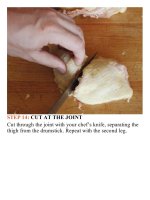The food lab better home cooking through science ( PDFDrive ) 389
Bạn đang xem bản rút gọn của tài liệu. Xem và tải ngay bản đầy đủ của tài liệu tại đây (132.85 KB, 2 trang )
marinades will not rescue poorly cooked or bland meat.
Aftertestinghundredsofmarinadevariationsonallsortsof
meat, I’ve found that the best marinades share three
commoningredients:oil,acid,andasaltyliquid,preferably
aprotease(moreonthoselater).
KeytoGreatMarinades#1:Oil
Oil is essential for three purposes. First, it emulsifies the
marinade, making it thicker and tackier, causing it to stick
more efficiently to the meat. Second, many flavorful
compounds—like those in onions, garlic, and many spices
—areoilsoluble.Withafat-basedmediumcoatingthemeat,
yougetbetter,moreevenflavordistribution.Finally,theoil
helps the meat cook more evenly, providing a buffer
between the heat of the grill and the surface of the meat.
Omittingitdetractsfromallthreeofthesequalities.
KeytoGreatMarinades#2:Acid
I used to think that acid was essential in a marinade for
tenderizing purposes, and it’s true—acid can slightly
tenderize tough connective tissue in meat. Unfortunately,
excessive acid can also start to chemically “cook” meat,
denaturing its protein and causing it to firm up and
eventually turn chalky (think: ceviche). If you’re going to
use acid in a marinade, it’s best to go with no more than
equalpartsacidandoil,andlimitexposuretimetounder10
hourstopreventthemeatfromgettingchalky.Youmaybe
surprisedtolearnthatdespitetheirreputation,marinadesdo
not actually penetrate particularly far into meat—even after
the course of a night, a marinade will penetrate no farther
than a millimeter or two, and that penetration rate slows
down the longer you marinate. So really, a marinade’s
effectsarelargelylimitedtothesurfaceofthemeat.
KeytoGreatMarinades#3:SaltandProteases
Thefinalingredientinagoodmarinadeisasaltyliquid.The
muscleproteinmyosinwilldissolveinasaltyliquid,leaving
the meat with a looser texture and a better ability to retain
moisture. Want to do even better than just salt? Consider
adding a protease to your marinade as well; That’s an
enzyme that breaks down proteins. Soy sauce is a great
choice.
Bonus:Aromatics
Aromatics are mainly a surface treatment, but they can still
be quite powerful. Garlic, shallots, dried spices, herbs, or
chilesareallgoodthingstoexperimentwith.
HOWTOMARINATE









